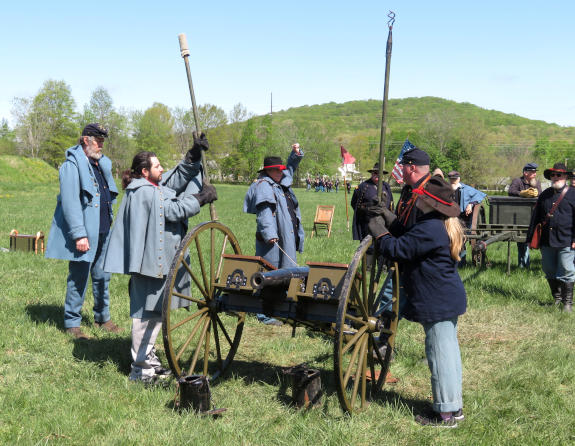NEWS OF 150 YEARS AGO
November/December 1861
From The Missouri Democrat, Saturday, November 9, 1861.
The Art of Shopping.
We are all satisfied that gentlemen have no genius for shopping. They are not equal to it. Nature has left their faculties imperfect in that particular. They can write books and make speeches, and all that sort of thing, but they are not up to shopping. It takes the ladies for that. Men go to a store, select what they want, and buy it. But that is not shopping; that requires no genius. Men pretend they do not like to go shopping with the ladies. I wonder who ever asked them? What lady would have such an incumbrance on such occasions? Men are well enough in their places. Young gentlemen are convenient to take us to concerts, and see us home from church, and bring us boquets [sic] and music; and husbands are useful to pay the bills, &c., but for a shopping excursion they are quite out of place. Do you understand me to insinuate that I have distinguished ability that way? Not at all; I only speak of my sex. In fact, I acknowledge myself a poor hand at it. But my friend, Sallie R______, is a model shopper; I am taking lessons of her, and hope to be perfect by the time I am married. A few days since she invited me to go with her.
“I wish to look at the new style of silks,” said she.
“Why, do you want to get a new dress?” I asked.
“Really,” said Sallie, “If it was not impolite, I should say you were a verdant. I don’t want a dress, but that’s no reason why I should not see the material.”
So Sallie and I sallied out. The first store we entered she asked whether the merchant had received his spring goods. He said he had, and inquired what she would like to see?
“Show me your new style dress goods,” said she, “such as barege robes, and lawn robes, and handsome striped plaid silks; brocades and changeable silks are not much worn this spring, but I’ll look at your solid colors.”
The merchant soon had his counter spread with goods. She examined and tossed then about, making various creases in them to see whether they would come out again by rubbing.
“What style is worn?” said Sallie to the clerk.
“Well, we sell probably more plaid stripes than any other.”
“Have you any with chene stripes?” inquired Sallie.
“Oh, yes! Some very fine;” and a number of pieces were produced.
“Well. I can’t say, after all, that I like the chene stripes; the green is very pretty.”
So Sallie held it in various lights, rubbing it and creasing it.
“Well, it don’t crease much, ” said she; “I wonder whether it will cut?”
“No, it is boiled silk, and we find that the plaid and stripes wear very well.”
“Your silks are very pretty, and you may cut off a sample, if you please,” continued Sallie.
This the merchant was forced to do, though with rather a bad grace, as most of his goods were in patterns, and he feared spoiling the piece.
“Will you be kind enough to give me samples of the solid colors?”
They were all furnished.
“This plaid, you say, is $1.37? Is that the lowest?”
“Yes, we can’t take less.”
“How many yards in the pattern?”
“Fourteen.”
“I’d rather have eighteen; perhaps I might conclude to have flounces. Well I’ll take the sample and show it to my mother, and then make up my mind. Have you any Coates’ cotton?—give me a spool, No. 33.”
This was handed her; she paid five cents and we left. I looked at my watch. We had been there exactly an hour!
“What a cheat! I can buy the spools for four cents,” said Sallie, when we are fairly out; “and besides, we forgot their shawls.”
So we went to another store.
“Have you any Stella shawls?”
“Yes, some beautiful ones, just opened. Would you like to see the broche borders or printed?”
“Both.”
“Any particular colors?”
“No sir; I’ll look at them all,” said Sallie.
Different colors and patterns were accordingly produced.
“What is the price of green center broche border?”
“We can afford you that for $9; same style sold for $15 two months ago.”
Some printed borders were put up for $4.50.
“No, I prefer the broche, but can’t you take less?”
I saw a twinkle in the merchant’s eye which made me think he knew she was only shopping.
“Now,” said he, “if you won’t mention it, I’ll let you have it for $6.”
Sallie looked surprised. She knew the article was selling at $9.
“Six dollars; is that your lowest?”
“Well, to oblige you I will say $4!” said the merchant.
A pause ensued.
“Then you think $4 is the lowest.”
“Ahem! Have a large lot and want to dispose of them. I’ll say $3.50!”
“Are you sure it is a first-rate piece of goods?”
“I’ll warrant it all silk and wool,” said the merchant
My friend was caught. Turning to me, she whispered:
“I do wish I had brought some money!” and then addressing the merchant, said, “I will call again!”
I never was so glad to get out of a store before; for the clerks had gathered around us, seeming to understand the joke. But Sallie went home, got the money, and insisted upon my returning with her to the store for the shawl. The trader said he was sorry, very, but the shawl had just been sold! And so was Sallie, too, I thought. We went shopping no more that afternoon.



